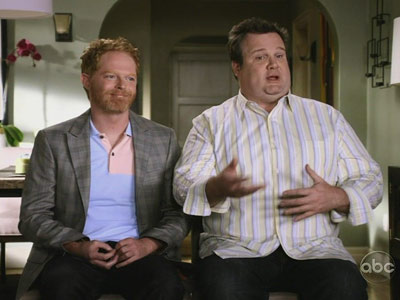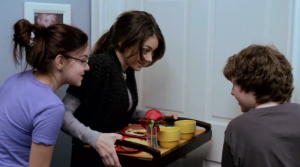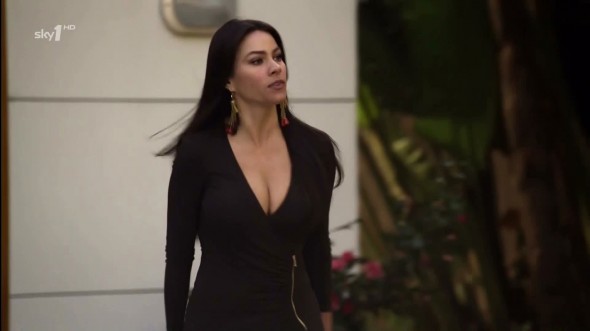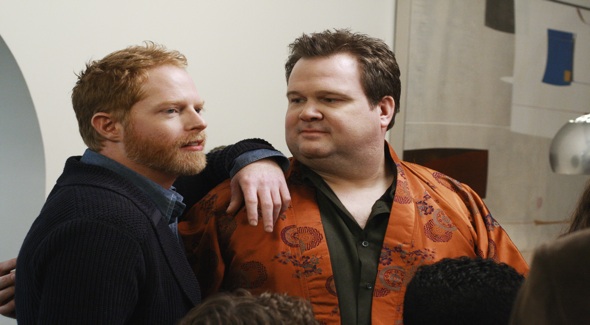
An easy response to why no one’s that offended at Modern Family is that, while Cameron and Mitchell are gay, they aren’t that gay. Sure, they talk about theater, they enjoy themed brunches, and they gesture with limp wrists. But they’re not … y’know. Fa-LA-ming.
This sort of critique is, of course, dismissive to a wide swath of gay culture. Not every gay male needs to fit a particular, narrow stereotype. To insist on that – or to act surprised when someone steps outside it – reduces identity to a series of signals. And what’s worse, they’re rather blunt signals. Not every gay guy has to be a loud, gossipy Liza Minelli fan.
And yet it’s worth considering, at least from the standpoint of cultural critique. Prior to the late 00s, gay characters on primetime television were primarily about their gayness. Their reason for existing was to be gay in a place. Some of them are simply neurotic and uptight (Will of Will and Grace); some of them are spastic and emotional (Will’s friend Jack, also of Will and Grace). But their sexuality was a defining feature. The point of Will being gay in Will and Grace is so the two title characters can have a long-term friendship without the “will they or won’t they?” ambivalence that two sexually compatible people would have.
Modern Family features two gay characters whose sexuality is not a punchline. At least, no more often than any other character. There are plenty of jokes about Jay and Gloria’s May/December marriage, and Phil and Claire’s sex life has been the focus of a few episodes (including one recent one, on which more in a moment). But aside from the occasional reference to figure skating or a taste in furniture, you wouldn’t know that Cameron and Mitchell are gay.
Our first instinct is to say that that’s a good thing. “Gay” is no longer a character trait, like “selfish” or “ambitious” or “nurturing.” There’s no longer a package of required behaviors and speech patterns that attach to homosexuality. People just are or aren’t gay. If our preferred cultural outcome is to treat everybody exactly the same, this is an improvement.
Our second instinct?
Let’s consider the recent episode “Caught in the Act.”

The episode begins with Phil and Claire’s three kids making breakfast in bed for the two of them to celebrate their anniversary. They open the bedroom door, only to find Phil and Claire doing what married couples do on their anniversary. Nothing graphic is shown, since this is broadcast television. Handheld camera shakiness plus some quick covering up with sheets means we only see a bit of skin. But it’s clear, given the relative positions of Phil and Claire, not only that they were having sex but how they were.
It’s funny. It’s a little bit salacious, but harmless when compared to (say) Glee or Gossip Girl. And it ends on an up note.
We’ve never caught Jay and Gloria in as flagrante of a delicto, but Gloria as a character is defined by her sexuality. The nature of her relationship with Jay – a second wife, a younger and hotter wife – carries with it the implicit assumption of why Jay married her. Most of her outfits show off her rather impressive figure. While there’s more to Gloria than just being a sexy South American chick, it’s impossible to forget for a second that that’s what she is.

Lest we forget.
So Phil and Claire get their sexuality. Gloria and Jay have theirs. What about Mitch and Cameron?
Mitchell and Cameron’s relationship was so Platonic through the first season that a Facebook campaign was started demanding that they kiss. When the two finally did kiss onscreen (S2E2, “The Kiss”), it was such a dry, brief kiss that you could easily have missed it. Ryan Murphy, creator of Glee, called the couple’s lack of affection “ridiculous,” and when the creator of Glee thinks you’re ridiculous it’s time to evaluate your creative choices.
Since then? No sex jokes. No one walking in on them. Not even the occasional smoldering glance. The closest we’ve come to seeing them express their sexuality is when they ogled James Marsden in “Slow Down Your Neighbors.”
No one says that Mitchell and Cameron need to go to the other end of the spectrum – becoming dishy queens whose every sentence drips with innuendo. But given the acknowledged sexuality of every other couple on the show (usually played for comic effect), the monastic relationship of Mitch and Cam stands out. TV audiences are ready to accept a gay couple, it seems, just so long as they’re not too gay about it.
Why is that?
First, the sitcom as an art form is inherently conservative. I don’t mean “conservative” in this case as attached to a party’s fiscal policies. Rather, I mean “conservative” as in “traditional.” Preserving the status quo. Not rocking the boat. Predictable.
Though sitcoms showed married couples sleeping in the same bed as early as the Forties, it wasn’t the TV norm. Lucy and Desi, Dick and Mary, Ralph and Alice – a decade or more of couples who slept in separate beds, despite the practice being pretty rare in America. Babies would arrive in a series and grow into sidekick brats, but the method of making babies was never mentioned.

In fact, how many sitcoms can you name that ran longer than three years that didn’t end with male and female leads marrying off? And having children? Seinfeld’s one example, but Seinfeld is the exception that tries the rule: a groundbreaking instance of post-modern neurotic comedy that challenges us to find something likable in its stars. But even Friends, a sitcom which took place at the same time, in the same city, and with a similarly self-absorbed cast of thirty-somethings, ended its run with every star married and/or pregnant.
What do sitcoms tend to teach us? That you should stick by your family. That you should tolerate other people (except the REALLY weird ones). That you should find a job – preferably one you like, but that’s not necessary – and work hard at it. That you have certain responsibilities that you have to live up to, no matter how painful they may be, and that doing so makes you a better person.
These morals are so ingrained into the sitcom formula that it’s tough to escape them. We applaued Arrested Development and 30 Rock for being mold-breaking comedies, laden with self-reference and irony. But how many episodes of Arrested Development ended with Michael siding with his family – the family that regularly lied, cheated and schemed to get a few more dollars out of the Bluth fortune? How many episodes of 30 Rock end with Jack or Liz forgiving a member of their cast for an egregious mistake?
The morals of a sitcom may not sound that objectionable. And that’s what makes them work. They’re not objectionable. No one’s going to label you a monster for saying “you gotta stick by your family.” But it’s not always true. Watch American Meth, or Precious, or Million Dollar Baby if you want a lesson on when you should abandon your family. Watch The Man in the Gray Flannel Suit or The Smartest Guys in the Room to learn the virtues of walking away from your job. The lessons of sitcoms, as agreeable as they are, present a staid, unchallenging view of life.
Part of this is economics. Sitcoms are the offspring of marketing departments, designed to sell washers, dish soap or mouthwash in 30-second increments. Advertisers hate courting controversy (unless it’s in a calculated attempt to be edgy). So a sitcom can’t be too challenging without alienating its sponsors.
Part of it is aesthetics. A sitcom is meant to run for as many seasons as it’ll stay profitable. Creating a work of art that’ll stretch into perpetuity is immensely challenging. You try writing a 1024-day song. Bringing characters back to stable points – family, work, neighborhood – keeps the narrative focused. So long as there aren’t any radical changes, the writers can keep using the same characters, the same relationships and the same sets.
Whatever the cause, the result is the same. Sitcoms are rarely, if ever, going to break social barriers.

It’s “What does a lesbian bring to a second date?” and it always has to be told with it’s companion joke: What does a gay man bring to a second date? What second date?
Ha!
My favorite version of the joke is: “What does a lesbian bring to the second date?” “A moving van and two cats.” But maybe that’s just because of my love of kitties :)
“In fact, how many sitcoms can you name that ran longer than three years that didn’t end with male and female leads marrying off?”
I wanted to use M*A*S*H as an example of a very long running sitcom that didn’t end with the leads walking down the aisle. And while it may still be true, strictly speaking, I forgot that Klinger does get married. Bummer.
It is my great hope that Community (if it lasts more than 3 years) will not fall into this trap or, if it does, will mock it relentlessly.
I realized this morning that, while Cheers had several of its cast married by the time it finished, they weren’t all married to each other. Which is refreshing.
This reminds me of something mostly unrelated that I mentioned to my wife the other day about The Office (US version). In that show, they have systematically dismantled every relationship among the regular cast that pre-existed the first episode. Think about it: Stanley & Teri, Pam & Roy, Kevin & Stacy, Oscar & Gil, even Jan and Mr. Gould (David and Mrs. Wallace are probably lucky that he got fired, or their marriage was doomed).
I’m not sure what it means, but it’s kind of disappointing to me for some reason. Pam’s character arc since she got with Jim is also disappointing to me on a lot of levels, and could have been the example for a very similar essay to this one about the conservatism of even innovative American sitcoms.
How I Met Your Mother originally intrigued me because it seemed to be actively examining our expectations of a sitcom relationship. Because the story is told in flashback, Ted and Robin’s “will-they-won’t-they” is a foregone conclusion; they won’t, at least not permanently. Also, Marshall and Lilly’s engagement happened at the beginning of the first episode, as opposed to a “big reveal” later in the show.
I’ve since been disappointed with several of the directions they’ve decided to take the show. The sitcom conventionality of Barney and Robin’s courtship, in particular, hugely diminished their characters’ effectiveness for me. This has dimmed my hopes for a non-standard ending; obviously Ted was going to end up married, but I had hoped that other characters’ plot lines would end in more interesting ways. Ah, well.
HIMYM is frustrating. Although it has, largely, removed the “Sam and Diane” sitcom trope (or at least approaches it differently) it still seems too close to Friends for comfort. It continually strikes me as Friends dressed up for the mid-2000s. I suspect that the show’s disappointing conventionality correlates with its success.
I think that’s largely what they’re trying to do. Yeah, there’s the overarching romantic story to HIMYM, but the core is “a group of friends have wacky adventures in NYC”. It’s an attempt to recapture Friends’ success.
NewsRadio ran for 5 seasons, and Lisa was the only member of the main cast to get married. They had to fight the executives on that though. The series finale also avoids the message about the overriding need for “family.”
That 70s Show. Granted most of the cast were Highschoolers and Red, Kitty, Bob, and Midge started as married couples, but in the end not one of them were actually married during the course of its 8 seasons(although Eric and Donna came close).
What about Hyde and his stripper wife? Or did she leave him? Or Fez and Lory? I suppose neither of those are particulary relevant since the show didn’t end on either of those. The thing about the end of that show that I never liked though, was that it sets it up as though you’re about to see the characters on the brink of new lives, but no no no, they’re still just doing the same old thing. There is one gay student in that show though, and I recall him being met with medium resistance to the idea.
There are actually multiple gay characters (and IMO Fez is gay as well). We even saw a gay couple in the pilot episode (at the Rundgren concert), and Fenton a repeat character in the later seasons is very effeminate and well gay. I don’t count FezxLaurie or HydexSam because one was for a green card and the other was never technically a marriage because Sam was still married to another man.
the assistant has a crush on mitchell? things are looking up!
oooh what a twist! :-p (that’s what i get for posting at the beginning of the episode.)
But again with the chaste gay intimacy dodge! Perich is really on to something here. In an episode in which Claire and Phil’s storyline is _entirely_ devoted to their sex life (screw the kids! forget the law! it’s sexy time! underpanties!), Mitchell and Cam have a jealous spat, an emotional reconciliation, aaaaand a blink-and-you’ll-miss-it peck (on the cheek? it was hard to tell, the cameraman seemed to be terrified).
Sigh. It also seems like they’re really going down the fa-LA-ming route with minor gay characters, as if to make it clear they’re gay they have to be really, really limp-wristedly blatant about it. The only counter-example I can think of on the show is James Marsden’s character, but I’m not entirely sure he was actually gay (though he was an absolutely insane trespasser/squatter, soooo… better?).
I feel like this last episode was perfectly timed to coincide with this article, since it seems like it spent its entirely trying its damnedest to prove every single one of Perich’s points.
Hm, in rereading this comment it comes off as overly negative, but to be fair I actually really enjoyed the episode. I just couldn’t help thinking of this article throughout, and how true everything herein is.
That is so true! I thought the little montage of everyone enjoying their Valentine’s Day illustrated this article perfectly, and maybe even went a little further in setting up a triple standard.
So we have the most “unconventional” couple, Cam and Mitch: chaste cuddle and peck.
Then the midway couple (ie, interracial, age-divide, but still heterosexual couple) Jay and Gloria: Full body touch, slightly more suggestive as both straddle the motorcyle.
Then the Gold Standard conventional couple (white, young, heterosexual, hetero-normative, breadwinner male homekeeper female): full on hot and heavy reclining make-out.
I had a thought about your “The lessons of sitcoms, as agreeable as they are, present a staid, unchallenging view of life.” paragraph. It seems like this is inherent in the form right? Sitcoms are not about Enrons or meth heads. If they were they would cease to be sitcoms and instead be dramas. Part of sitcom-ness seems to be the notion of normalcy. This is in part why people seem to like them so much. They are relatable. Not many people have to face tough moral dilemmas at work or meth addiction but most plots in sitcoms are highly relatable.
Think about Californication, it has many of the troupes of a sitcom. It is a half hour long, it is fueled by its comedy, situations the characters find themselves in seem to be contrived merely for comic effect, the ideals of the family and true love are held up and the characters seem destined to end up together. But is it a sitcom? Almost certainly not. Why? I am not sure. It might be that Hank is flawed and dramatically so. Hank, drinks and parties but it clearly creates dramatic problems (he almost dies, he has sex with minor, people around him die) that are outside the bounds of normalcy.
Oddly Seinfield which you call out as an exception to sitcom model in part works because it so grounded in the normal and the mundane. In fact both Seinfield and David’s comedy rely on the familiar and social conventions (and perceived or real violations of them). Without culture expectations of normalcy their comedy wouldn’t work.
I think that the portrayal of readicals as driven by “rage” is unfair though. I can sort of understand the perspective, but you’ll have to know that there’s another one too. The thing is, all of this article is talking aobout gay characters for straight audiences and gay activism for stright audiences. But the LGBTBI people are part of society too! It’s the basically the same problem as has developed in relation to feminism recently. The idea behind any depiction of such a character or such a debate is by the general public seen as hainv the only purpose of winning them over. But the fact of the matter is, that neither gay people nor activism exist for that purpose.
The fact of the matter is that gay people watch tv too, even though they are mostly ignored as an audience. That a few gay characters pop up and cause the climate to soften a bit doesn’t really change that. That Mitch and Cam are inoffensive is part of the problem, because they are there to help the slow process from acknowledging that gay people are people too to acknowlednignt hat maybe something needs to change instead of actually bringing the kind of relief and the kind of progress that the LGBTQI community needs right now.
There is a reason why the “respectable” gay rights movment had to give way to the “angry” queer one, and that reason was that they simply sacrificed too much of their own member for a plan that brought as good as no progress for those who really needed it. In the end, it all comes down to purpose: are we doing this for ourselves or are we doing it for someone else? And sadly, when you really are working to make progress for your own sake, people tend to find it uncomfortable. But then one has to ask wether it’s the majority’s need for ajustment or the minority’s need for actual rights that is the most acute.
This was a really good article, and though I enjoy watching Modern Family, you’ve pinned down something that’s been bugging me about it.
Cameron and Mitchell, as a cultural phenomenon, do have value – they’re two of the best-drawn gay characters on TV. But their consistent lack of affection (explained in-show by Mitchell just not being a very touchy-feely type of person) does seem kind of weird in many contexts.
At least they have chemistry.
I LOVE LOVE LOVE the show ‘Modern Family’ it is very witty.
the 3 families are so diff yet at the end of it all they come together as one & move on from the lil hickups that life & social situations throw at them.
the 1st season came on tv and followed it from 1st episode to the last without fail… cant wait for the next season to start, if they are going to show it in India that is, & i hope & wish that they do.
AWESOME!!
“The divergence between peaceful conservatives and angry radicals has cropped up in every minority rights movement in the Twentieth Century. Consider Gandhi and Jinna[.]”
So Indians are a minority in India?